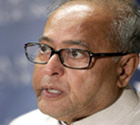
Strike hard while the iron is hot. Perhaps this is not the right time to strike when the composite dialogue between India and Pakistan, after a gap of six months owing to political turmoil in Pakistan, has been commenced. But, at the same time we must not forget that the meeting has been started amidst the unprovoked firing from the other side of the Line of Control, which (the incident) naturally holds suspicion.
Though Pakistan is pledging to move together towards the right direction in resolving the issues of bone of contention between the two neighbour countries, India needs to be careful on its part.
Keeping Pakistan's past record in mind of stabbing at the back, it is good for India to move ahead with Pakistan, but bear in mind that safety lies in the middle course. Since the dialogue is good for the people of both the country and the international watchdog keeping eye on the progress of meeting, India on that pretext could not retreat from meeting. So India is doing well in moving forward, but should move with cautious and not with a blind eye.
After all, India is like a burnt child, which must dread the fire. At the same time Indian government as well as the people must discard the age-old tendency of start counting chickens before they hatch.
India has showed good diplomatic skills for not accusing Pakistan for Jaipur’s serial blasts; the allegation could spoil the improving relationship between the two, when India has no concrete proof of whose hand in the blasts. But, India needs no more evidence to prove that Pakistani army had hand in infiltration attempt in Jammu and Kashmir and ceasefire breaches along the Line of Control, LoC in recent days.
It may be a point of discussion what triggered Pakistani Army to retreat from the five years long ceasefire agreement continuing in effect since 2003 and propelled them to unprovoked firing. Is it an attempt to divert the attention of India from raising fundamental issues and the issues of common interests or Pakistan wanted India to raise Kashmir issue itself at the Indo-Pak parleys?
Here, we should not forget that after formation of the new government in Islamabad two months ago, Yousaf Raza Gillani after taking oath of Pakistan's new Prime Minister on March 25, 2008 had said that “Kashmir will be the core issue in the agenda of composite dialogue between India and Pakistan.”
India's Foreign Secretary and Foreign Minister have been participating in the composite dialogue at parleys between India and Pakistan being held in Islamabad. Both the sides are hoping to come out with some concrete and progressive approach. New Delhi is expected to brief Pakistan's new leadership on issues such as terror, economic cooperation, peace and security, and cross-border infiltration, besides other issues of mutual interest to the two countries.
Bilateral trade can be stepped up, Iran-Pakistan-India (IPI) gas pipeline can be discussed, visa norms for the travellers from either side can be eased. Besides, releasing of prisoners from the either side can be facilitated. But, New Delhi must register her strong opposition to Islamabad against evil elements indulged in hampering peace process, and continuing violence and terror in India.
People of both sides want peace and are eager to maintaining friendly relationship with each other. Leadership of both the countries should stop doing politics over Kashmir and try to find out the reasonable, peaceful, and permanent solutions of the Kashmir issue and should go ahead on issues of mutual interests of the two countries.
|
|
Read More: Delhi


Comments: